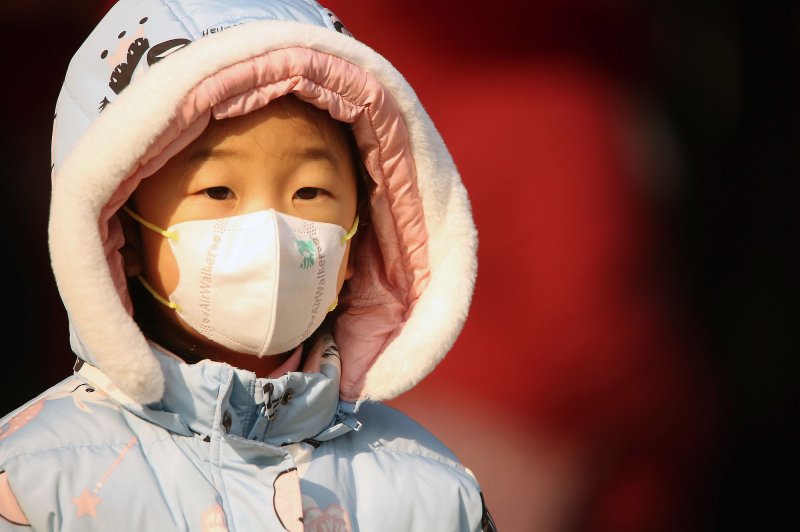1 of 4 | A Chinese citizen wears a protective respiratory mask in Beijing, China, on Wednesday to guard against the spread of a coronavirus. Photo by Stephen Shaver/UPI |
License Photo
Jan. 22 (UPI) -- China on Wednesday issued a travel ban for all residents of Wuhan, the epicenter of a coronavirus outbreak that's killed at least 17 people.
The ban comes as millions of people in mainland China are expected to travel long distances to celebrate the Lunar New Year.
The city is shutting down all public transportation, including buses, subways and ferries, beginning 10 a.m. Thursday. Officials also canceled all flights and trains departing from the city in central Hubei province.
Transportation officials didn't ban travel by private vehicles, but warned that "citizens should not leave the city unless there are special conditions."
Health officials are attempting to contain the coronavirus outbreak, which likely began in Wuhan seafood market, which has since closed. The virus was initially thought only transferable by animals. Experts now know it can be spread by humans.
The death toll rose Wednesday after eight new deaths were confirmed in Hubei province, and the number of cases has risen to to 509 across mainland China, officials said.
Two new cases were reported in Hong Kong on Wednesday. One involved a Wuhan resident and both were moved to an infectious disease facility at Princess Margaret Hospital. Another possible case was reported in Mexico and that patient was under observation. Cases have also been reported in Japan, Thailand and South Korea and most are connected to the Wuhan outbreak. The United States confirmed its first case of the disease Tuesday, leading federal officials to screen travelers and distribute a quicker coronavirus test.
Researchers at Imperial College London estimated Wednesday there may be more than 4,000 cases of the novel Wuhan coronavirus outbreak, a figure based partly on the total volume of international travel from Wuhan in the last two months.
The World Health Organization said the disease is a new coronavirus strain not previously identified in humans. After an emergency meeting Wednesday to decide whether the outbreak meets the criteria of a public health emergency, WHO officials said they would meet again on Thursday to make a decision.
WHO director-general Tedros Adhanom Ghebreyesus told reporters after the meeting that the situation is "evolving and complex" and said more research is needed before the organization mobilizes the global public health infrastructure.
"The decision about whether or not to declare a public health emergency of international concern is one I take extremely seriously, and one I am only prepared to make with appropriate consideration of all the evidence," Ghebreyesus said.
Chinese National Health Commission Deputy Director Li Bin said in a televised address the coronavirus was first detected in Wuhan last month.
"Our experts believe the cases are mostly linked to Wuhan," he said.
Health officials in Wuhan first learned on Dec. 31 that patients were ill with pneumonia caused by a mysterious virus. It was identified a week later as a coronavirus similar to the one behind severe acute respiratory syndrome, or SARS.
Li said some medical workers in Wuhan have contracted the virus, suggesting "community-based transmission" is possible, and suggested it could mutate and spread further.
The National Health Commission has upgraded the new coronavirus strain to a Class B infectious disease, but Li said it will be treated in Class A, which allows health officials to quarantine suspected cases and lock down areas.
With Lunar New Year celebrations scheduled for Saturday and millions expected to travel, Li said China is taking stringent measures to contain the virus -- including quarantines for patients and persons they are in contact with. They will also screen at bus stops, airports and other populous venues.
"We must not let down our guard and we must be highly vigilant," he said.















